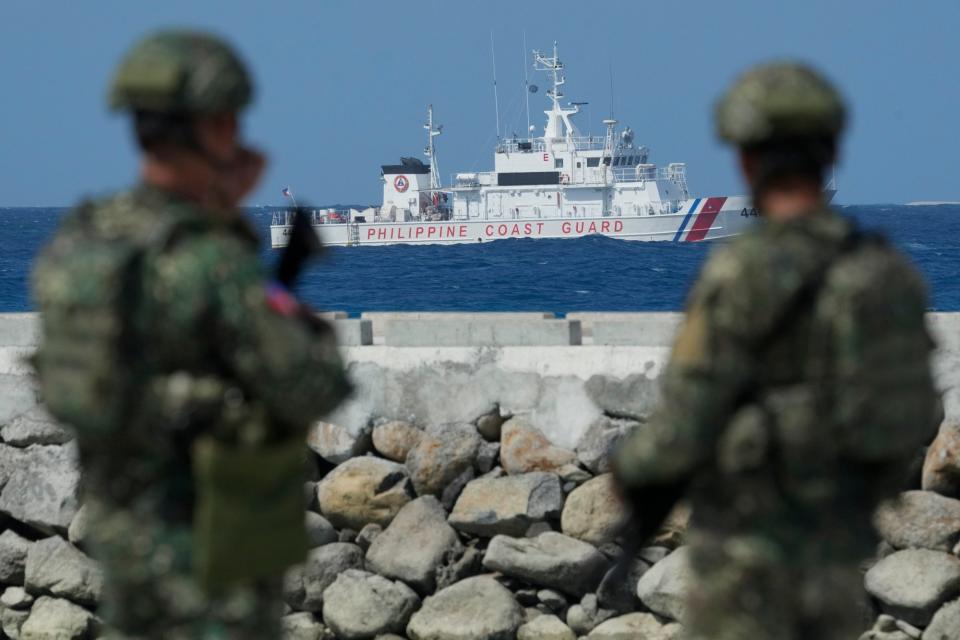A move by the Philippines to have the United Nations formally recognize the extent of the continental seabed in parts of the disputed South China Sea could encourage similar claims from rival claimant states, observers said.
The UN may not give what Manila wants, but the move will further complicate already complicated regional disputes and potentially lead to tougher countermeasures from Beijing, she added.
According to Manila’s Department of Foreign Affairs, the Philippines last week filed a complaint with the UN Commission on the Limits of the Continental Shelf (CLCS), seeking confirmation on the extent of its submarine continental seabed in the West Palawan region , opposite the South China Sea.
Do you have questions about the biggest topics and trends from around the world? Get the answers with SCMP Knowledge, our new platform of curated content with explainers, FAQs, analyzes and infographics, brought to you by our award-winning team.
“The seabed and subsoil extending from our archipelago to the maximum extent permitted by Unclos contain significant potential resources that will benefit our nation and people for generations to come,” said the Philippine Assistant Secretary of Foreign Affairs, Marshal Louis Alferez, in a statement.
Unclos is the 1982 United Nations Convention on the Law of the Sea, which grants exclusive rights to a coastal state to exploit natural resources on the continental shelf.
The Philippines’ move drew swift opposition from Beijing, which urged the commission not to review Manila’s submission as it involved the disputed maritime space.
Chinese Foreign Ministry spokesperson Lin Jian said on Monday that the committee should not consider or qualify the Philippines’ submission when it comes to the demarcation of disputed waters, in accordance with the CLCS procedural rules.
Lin said Beijing is still gathering information, but Manila’s “unilateral submission” of an extended continental shelf infringes on China’s sovereign rights and jurisdiction.
Maritime affairs experts expressed similar views, predicting that Manila’s bid was unlikely to succeed, and Beijing would view the move as a legal challenge that would further complicate the South China Sea disputes.
“It seems unlikely that CLCS can validate such a claim… the Commission has generally avoided making demarcation decisions where there are pending jurisdictional or sovereignty disputes,” said Isaac Kardon, senior fellow for China Studies at the Carnegie Endowment for International Peace .
Beijing is said to view the claim as “a new legal and political challenge from Manila,” much like the 2016 South China Sea arbitration, and see it as an attempt to undermine China’s expansive claims using an institutional approach of the UN, he added.

Information continued to be gathered on Manila’s “unilateral submission” of an extended continental shelf, China’s Foreign Ministry said on Monday. Photo: AP alt=Information continued to be gathered on Manila’s “unilateral submission” of an extended continental shelf, China’s Foreign Ministry said on Monday. Photo: AP>
Mainland China claims almost the entire South China Sea, including parts claimed by the Philippines, Brunei, Malaysia, Taiwan and Vietnam.
In 2016, an international tribunal ruled in favor of the Philippines, rejecting China’s broad claims as having no legal basis. However, Beijing has rejected and criticized the ruling.
Experts said that while the details of Manila’s submission had not yet been made public, its continental shelf claims could overlap with those of other littoral states in the South China Sea, potentially prompting other claimant states to adopt similar tactics applying.
“The Philippines’ submission could be a potential risk that sets a precedent for other claimant states, and they may submit similar ECS (extended continental shelf) submissions to assert their rights,” said Ding Duo, an associate research fellow at the National Institute for South China Sea Studies in Hainan.
He added that the claimant countries could submit their comments separately, but joint submissions were also possible, and both situations would further complicate the South China Sea disputes.
“This will make the dispute even more complex and difficult to resolve, and introduces a new point of contention over how Beijing and Manila should properly manage and address their differences in the South China Sea,” Ding said.
“In a nutshell, Manila’s activities add more complexity to the already complicated South China Sea disputes, rather than simplifying them.”
But Lucio Pitlo III, the president of the Philippine Association for Chinese Studies, said the Philippines’ latest move and the 2016 arbitration were part of its efforts to use international law to protect its maritime claims.
“Both will affect the interests of other disputants in the semi-enclosed sea, although the 2016 ruling is officially binding only on Manila and Beijing, a ruling that China continues to reject. Likewise, a unilateral submission of the ECS may also impact the interests of other parties. coastal states,” he said.
Maritime observers predicted that Beijing would retaliate against Manila with harsh operational and diplomatic measures.
“China could also increase the intensity of their interdiction efforts at Second Thomas Shoal or escalate against Philippine interests elsewhere in the South China Sea,” Carnegie’s Kardon said, adding that China could also choose to extend baselines around to publish the Spratlys to refute the Philippines’ claims.
Baselines are an important concept in defining maritime boundaries and asserting jurisdiction over resources, acting as starting points from which a country’s territorial sea, exclusive economic zone, and continental shelf are measured.
According to Ding, Beijing could opt for stronger countermeasures to safeguard its rights at sea, especially during standoffs with Philippine ships in the South China Sea.
“Beijing believes it is crucial to make Manila pay a price for its actions, otherwise the country will continue to repeatedly provoke and upset its nerves,” he said.
The latest clash occurred on Monday when the Philippines sent another supply mission to an aging ship deliberately grounded on the Second Thomas Shoal to assert Manila’s claims. Beijing said Manila had tried to supply construction materials, which China has declared unacceptable.
China’s coast guard said Tuesday that it exercised control measures on the Philippine ships during Monday’s collision, such as issuing warnings, boarding the Philippine ship and conducting inspections.
Ding said the move was a clear demonstration of Beijing’s determination to implement effective control measures in response to the Philippines’ actions.
Citing an anonymous source, Philippine media reported that the Chinese coast guard towed one of the boats from the Philippines and seized the crew’s firearms during Monday’s collision, which also injured some Filipino crew members.
This article originally appeared in the South China Morning Post (SCMP), the most authoritative voice covering China and Asia for more than a century. For more SCMP stories, explore the SCMP app or visit the SCMP Facebook page Tweet Pages. Copyright © 2024 South China Morning Post Publishers Ltd. All rights reserved.
Copyright (c) 2024. South China Morning Post Publishers Ltd. All rights reserved.






